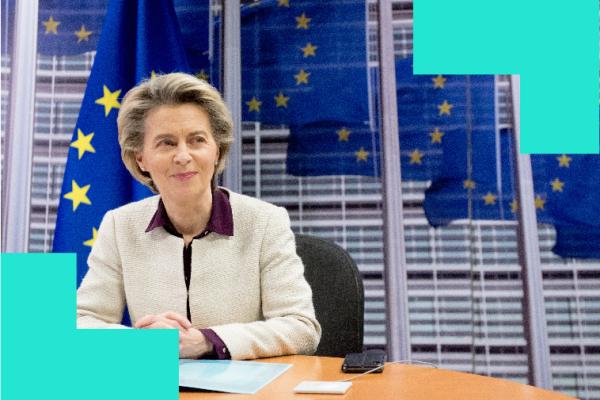Doubling down on business: key takeaways from President's Hanover visit
 Following other recent indications the EU is prioritising global business investment, European Commission President Ursula von der Leyen reinforced the need for the Europe to strengthen its position as an attractive business destination and industrial powerhouse.
Following other recent indications the EU is prioritising global business investment, European Commission President Ursula von der Leyen reinforced the need for the Europe to strengthen its position as an attractive business destination and industrial powerhouse.
Despite what could seem a side chapter in the President's closing comments before the upcoming election, her speech to open the 2024 Hannover Messe - a key trade fair to highlight European industry and innovation - repeatedly underlined the EU's plan to make Europe 'simpler, faster, and cheaper' for businesses. The success of this strategy could be seen as vital for the future of the bloc's economic stability.
Embracing Change, Staying Competitive
Von der Leyen acknowledged the profound shifts happening worldwide, from the impacts of climate change and digitalisation to geopolitical tensions disrupting trade flows, stating, 'The world is changing, and we will have to change.' Despite this critical note, she reiterated her confidence in Europe's ability to adapt and remain a significant player, citing its stability, planning security, legal certainty, and respect for business freedom. This is in line with the EU's messaging over the previous weeks and months, foreshadowing the probable shift in funding strategies after the election season wraps up in the coming weeks.
Unleashing Capital for Growth
A central focus is improving access to capital in the business sector. Von der Leyen noted that while venture capital can be scarce in Europe, a staggering €300 billion flows abroad annually from European private investors. 'That is capital that our own businesses could use for their own growth.' Integrating the European capital market could generate up to €470 billion in additional investment yearly, a game-changer for companies seeking funds.
Securing Energy Independence
Energy security and independence are also priorities. Despite the initial shock of Russia's gas supply cuts, the EU has found reliable new suppliers and expects gas prices to fall as LNG investments come online in 2025. Crucially, the bloc aims to provide cheap, clean energy from domestic sources to businesses located in Europe, bolstering both energy security and climate goals.
Nurturing Talent and Mobility
Von der Leyen emphasized the importance of skilled workers, calling the EU's education and training system 'unique in the world.' With €65 billion allocated for this period, the EU seeks to pave the way for more young people, women, and older workers into in-demand occupations. Additionally, the EU plans to facilitate the movement of workers within its borders, recognising that legal migration contributes to competitiveness and prosperity.
Embracing Digitalisation and AI
The EU is investing heavily in digitalization, cybersecurity, supercomputers, and digital skills, with €150 billion from the NextGenerationEU program alone. The bloc is also at the forefront of regulation in the sector - proposing sweeping legislation for the purposes of effectively - but safely - integrating the technology. Von der Leyen highlighted the EU's first-ever 'innovation-friendly regulatory framework for artificial intelligence and AI applications', which could become a global model, Europe's wealth of industrial data is seen as a significant advantage in this arena.
Expanding Trade Horizons
As a 'trade continent', the EU has concluded 74 trade agreements worldwide but recognizes potential threats from massive subsidies and protectionism in other markets. Von der Leyen pledged a three-pronged approach: remaining open while being vigilant, pressing partners for a level playing field, and casting trade nets wider through new agreements and investments, such as the €300 billion Global Gateway initiative.
Deepening the Single Market
Underpinning the EU's competitiveness push is the need to deepen the single market's integration - a message that's now become common parlance in the overarching EU communication strategy. Von der Leyen’s speech also drew parallels to the recent report by former Italian Prime Minister Enrico Letta, which warns that the gap with the United States is growing and urges making the single market 'bigger' by including sectors like energy, telecoms, finance, and defence. Letta argues for a 'single market with teeth' to enable European businesses to scale up more effectively.
Leading the Charge
Von der Leyen's speech and Letta's report underscore the EU's determination to enhance its business environment and maintain its status as a global industrial leader. By addressing capital access, energy security, talent development, digitalisation, trade relationships, and single market integration, the EU aims to provide businesses with the tools to innovate, compete, and succeed in an increasingly complex global economy.
As the world evolves rapidly, the European Union is positioning itself as a formidable force, ready to support and propel its businesses into the future. Continued messaging from EU institutions as toward a clear growth strategy backed by 27 member states acknowledges a difficult political and economic environment: the next election cycle will test the EU's place as a world-class competitor. However, the continued resonance of the need for a consolidated integration strategy gives hope that the bloc is up to the challenge.